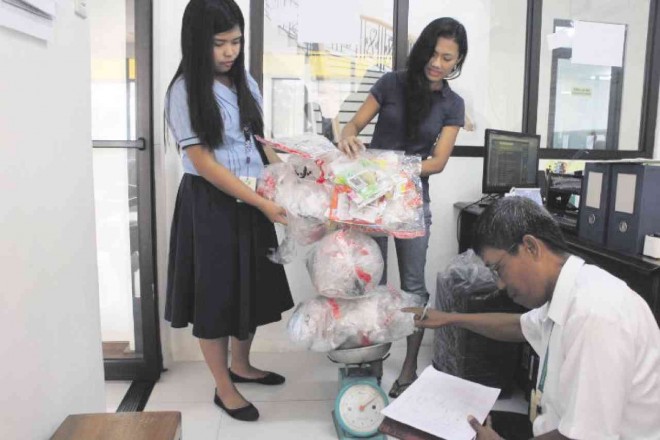In Tanay, Rizal, garbage out is very in

STUDENTS from a university in Tanay, Rizal province, turn over bags of residual wastes for a chance to join the “Basuraffle.” As of Wednesday, the municipal environment office has already collected 4,000 kilos of residual wastes, meaning it has given away 4,000 raffle stubs to its residents. PHOTO COURTESY OF TANAY, RIZAL MENRO
Residents in Tanay, Rizal province, are rushing to collect residual wastes that the municipal environment officer had to describe the frenzy as “nagkakaubusan na,” or already running out of garbage.
This is because for every kilogram of garbage collected, a resident becomes entitled to one raffle ticket in the city’s “Basuraffle,” a play on the words “basura” (garbage) and raffle.
A raffle draw will be held at the end of the month, starting July 31, for 10 lucky winners of household appliances, such as an oven toaster or a brand new rice cooker.
The activity is the first-class municipality’s latest gimmick as part of its solid waste management program. Tanay had a population of nearly 100,000 based on a 2010 census.
Carlos Inofre Jr., the environment officer, said the mechanics of the raffle were announced about two weeks ago, but officials did not expect this to trigger an overwhelming participation from the public.
Article continues after this advertisement“Our flea market was cleaned out of plastic (bags) and in schools, you’d see children collecting trash like candy wrappers,” Inofre said in a phone interview on Sunday. “Our garbage collectors could no longer fill up their trucks,” he added.
Article continues after this advertisementResidual waste are garbage that cannot be recycled, or what is left of the trash after going through a waste treatment process. Examples provided by Inofre’s office are plastic food wrappers, foil from cigarette packs and juice packs.
Tanay also has an existing program on biodegradable and the recyclable wastes—the “palit-basura” program, in which the local government gives out school supplies or detergent soaps in exchange for garbage collected from households.
Where do all these kilos of residual wastes go then?
Inofre said the municipality entered into an agreement with Cemex, a private cement company based in Antipolo City, also in Rizal, for it to collect and haul the residual wastes. The firm’s technology could turn them into a fuel source.
Tanay will not be paid anything for the garbage, “but we see this (deal) as a means to dispose our residual wastes.”
He said this would save the municipality, which produces five tons of trash a day, some P600 a month just for “pitting fee” to dispose their wastes in a landfill in nearby Morong town.
“This is to encourage residents to reuse and recycle wastes. Our target is zero wastes and it is possible,” he said.
Inofre said the town was also planning to partner with companies who might be interested in donating prizes for the raffle. “Who knows, maybe we can give away a car in exchange for garbage,” he quipped.